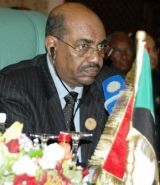Sudanese president to attend China-Africa cooperation forum
Oct 26, 2006 (BEIJING) –- Sudanese President Omar al-Bashir will participate in the Sino-African Cooperation Forum, which is to be held at the Chinese capital of Beijing during next November 1-7.
 Next week’s meeting in Beijing will focus on trade and economic development, and is expected to attract leaders and officials from more than 40 African countries, Chinese officials said.
Next week’s meeting in Beijing will focus on trade and economic development, and is expected to attract leaders and officials from more than 40 African countries, Chinese officials said.
The forum tends to review political cooperation between China and Africa. The final communiqué of the forum would focus on the work programme for 2007-2009.
The work programme includes cooperation and solidarity and development of the economic, commercial and scientific cooperation between China and Africa.
Beijing has been looking to Africa as a source of energy, new markets and investment opportunities. The volume of commercial exchange between the African States and China amounted to 50 billion US Dollars.
China has been criticized for dealing with governments such as Sudan that have poor human rights records. A conflict in Sudan’s Darfur region between government-backed Arab militias and the non-Arab population has killed about 200,000 people in the past three years.
In an interview this week with a French newspaper, World Bank President Paul Wolfowitz said Chinese banks ignore human rights and environmental standards when lending in Africa.
“We do not accept such criticism,” Zhai Jun, an assistant foreign minister, said at a news conference.
China believes no government “should interfere with other country’s human rights and internal affairs,” Zhai said.
A conference for 1,500 entrepreneurs from both sides will be held along the sidelines, focusing on cooperation on agriculture, water projects, construction, energy, transportation and pharmaceuticals.
There will also be an African product exhibition to show off food, lumber, textiles and handicrafts, he said.
Zhai said all of the 49 African nations that have diplomatic relations with Beijing say they will attend, including more than 40 heads of state, although the final numbers were not clear.
(ST)
